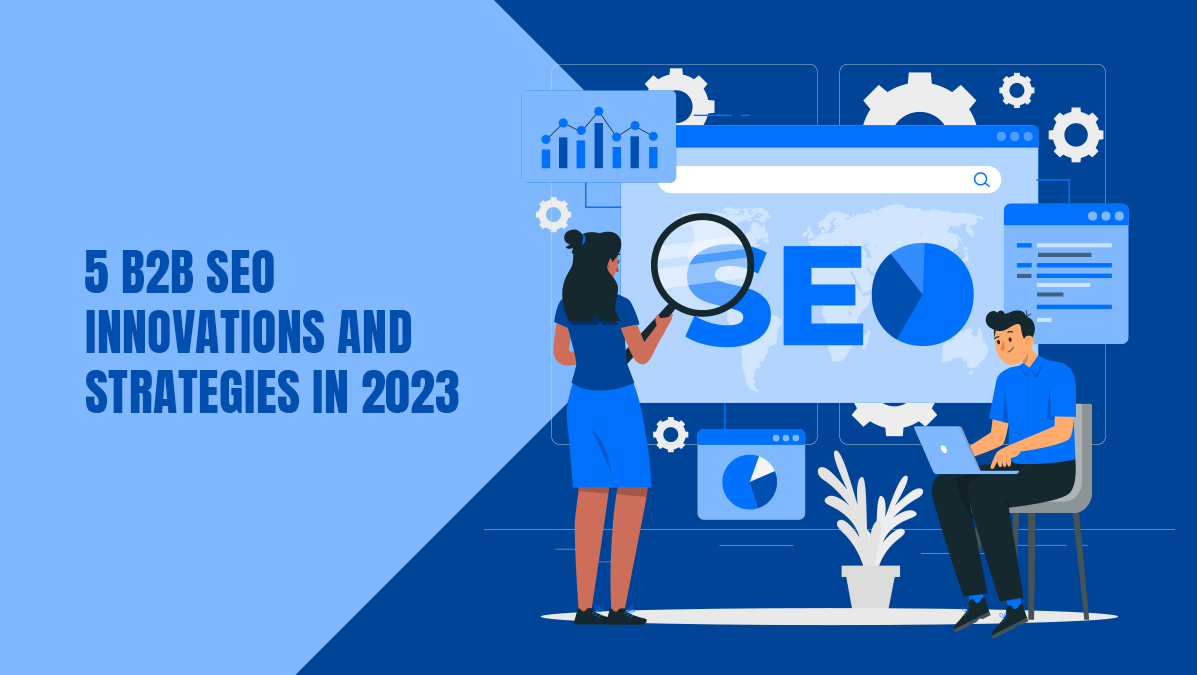In the rapidly changing digital landscape of 2023, a robust online presence is vital for B2B companies to drive traffic, generate leads, and maintain a competitive edge. SEO plays a pivotal role in achieving these goals.
This blog post, along with its comprehensive guide, aims to equip B2B marketers, SEO specialists, and business owners with the knowledge and tools necessary to create a successful B2B SEO strategy in 2023.
We will delve into understanding the latest trends and challenges, implementing effective keyword research, optimizing on-page content, building quality backlinks, and staying updated with SEO trends.
Let’s explore the key factors that truly impact B2B SEO.
Grasping the B2B SEO Landscape in 2023
The SEO landscape is continuously evolving due to search engine algorithm updates, shifts in user behavior, and the rising influence of voice search and AI. To develop an effective B2B ecommerce SEO strategy, staying informed about the latest trends is imperative.
Here are some key trends in 2023:
- Mobile-first indexing: Given that the majority of internet users access websites through mobile devices, search engines like Google prioritize mobile-friendly websites in their rankings. While the B2B industry predominantly caters to desktop users, mobile accessibility remains crucial as professionals also use their phones and tablets to browse, conduct research, and view websites.
- Voice search optimization: Voice search continues to gain popularity with smart devices and even in vehicles, such as Toyota’s latest operating system. B2B companies need to optimize their content for voice queries by incorporating natural language, long-tail keywords, and structured data markup to improve visibility in voice search results.
- AI in search and marketing: AI-powered tools like ChatGPT have witnessed significant growth, with millions of users leveraging their capabilities. OpenAI plans to roll out an enterprise-level offering, allowing organizations to utilize ChatGPT securely within their internal platforms. Moreover, Google’s announcement at Google I/O regarding additional AI experiences in users’ search journey further highlights the impact of AI on search engine results pages (SERPs).
- User experience and core web vitals: Search engines increasingly prioritize user experience metrics, including page loading speed, mobile responsiveness, and interactivity. Optimizing these aspects enhances both search rankings and user satisfaction. In 2023, users are more likely to abandon slow-loading pages within seconds, seeking alternative sources for the desired information.
- Continuous Google algorithm updates: Google now provides advanced notice for significant algorithm changes and updates. Staying updated with Google’s announcements is crucial, and resources like the Google Algorithm Update History page can assist in staying informed.
Conducting Effective Keyword Research
Keyword research serves as the foundation of a successful B2B SEO strategy. It involves identifying the keywords and phrases that potential customers use to find products or services in your industry. To conduct effective B2B keyword research in 2023, consider the following steps:
- Understand your target audience: Develop buyer profiling and gain insights into their pain points, needs, and search intent. Avoid assuming that your audience possesses the same level of knowledge about your product as you do. Understanding their operational knowledge allows SEOs to produce content that precisely addresses their search queries.
- Utilize keyword research tools: Leverage tools such as ‘Moz Keyword Explorer’ analyze data on search volume, keyword difficulty, and related keywords. Additionally, examine your own data in Google Search Console or Google Analytics 4 (GA4). These tools provide valuable insights for SEO and keyword-related research.
- Focus on long-tail keywords: Targeting longer, more specific search queries with lower competition (i.e., long-tail keywords) helps reach niche audiences and generate high-quality leads. Since most B2B product offerings serve a specific niche purpose, it’s advantageous to focus on keywords that describe the problem or solution your product or service addresses rather than solely relying on its name.
To conduct effective keyword research, it’s crucial to know where to start. Improving target audience identification, utilizing high-quality tools, and prioritizing keywords that align with users’ search intent can empower B2B SEO professionals to acquire the right phrases needed to attract more users and potential leads.
Optimizing On-Page Content
On-page optimization plays a vital role in making your website and its pages search engine-friendly.
Here are some best practices to optimize your on-page content:
- Meta title tags: Write or develop compelling, concise, and keyword-rich title tags and Meta descriptions that rightly describe your page’s content within the recommended 70-character limit. Optionally, include your business name at the end of the Meta title tag for brand visibility.
- Header tags: Use header tags (H1, H2, H3, etc.) to structure your content logically and enhance readability. Including relevant keywords in your headers helps signal the topic of each section. In blog articles, utilizing header tags can also serve as a table of contents, facilitating easier navigation for users in longer pieces of content.
- Image optimization: Optimize images by compressing their file sizes to improve page loading speed, using descriptive file names, and adding alt text that includes relevant keywords. This optimization assists search engines in understanding and indexing your visual content while improving accessibility for users with visual impairments.
- Site architecture: Establishing well-structured site architecture is essential for SEO success. It aids search engines and users in easily discovering your website pages, enhances user experience, facilitates efficient crawling and indexing by search engines, distributes page authority effectively, and contributes to overall website speed and performance.
While Meta titles and descriptions, headers, and site architecture may seem like fundamental SEO practices, they remain crucial cornerstones for properly optimized content. They enable faster indexing by search engines and contribute to a better user experience, aligning with Google’s emphasis on providing fast, discoverable, and easily readable content.
Building Quality Backlinks
Backlinks continue to be a critical factor in B2B SEO, as they demonstrate the credibility and authority of your website. However, it’s vital to prioritize quality over quantity when it comes to building backlinks. Consider the following strategies:
- Create link-worthy content: Produce high-quality and informative content that delivers value to your target audience. By providing valuable resources, you increase the likelihood of other websites linking to your content. Conducting research studies to generate industry data or creating visual assets such as infographics, white papers, and comprehensive guides can further enhance your link-worthy content.
- Separate content into distinct areas: Depending on your organizational size, it may be beneficial to separate different types of content. For example, having a dedicated section for press mentions or company announcements allows news outlets and other organizations to easily find and link to relevant content. Well-structured content areas make it simpler for external sources to reference and share your company’s announcements and updates.
- Seek partnerships: Collaborating with non-competitive organizations that target the same audience can generate additional exposure and traffic for your brand. Partnerships can involve joint email campaigns, co-creating content, or cross-promotion through various marketing channels. Strategic partnerships require careful planning to ensure mutual benefit and reputable practices.
While some organizations may still consider buying backlinks, this approach carries risks and often provides a low return on investment. Inbound link building through high-quality content and partnerships is a more reliable and effective strategy for acquiring quality backlinks.
Optimization for Results
From on-page optimization to building a solid backlink strategy, Optimization for results is the ultimate goal of B2B SEO.
Here are some additional tactics to consider:
- Mobile optimization: With the increasing use of mobile devices, it’s essential to optimize your website for mobile users. Ensure your website is responsive, loads quickly on mobile devices, and provides a seamless user experience across different screen sizes. Mobile optimization is not only crucial for user satisfaction but also a ranking factor in search engine algorithms.
- User experience (UX): User experience is a vital aspect of SEO. Search engines prioritize websites that provide a positive user experience. Make sure your website is easy to navigate, has clear calls to action, and offers relevant and engaging content. Pay attention to factors such as page load speed, readability, and mobile-friendliness.
- Local SEO: If your B2B business serves specific geographical areas, optimizing for local search is crucial. Create and optimize your Google My Business listing, include your business address and phone number on your website, and focus on local keywords in your content. Encourage customers to leave reviews, as positive reviews can improve your local search visibility.
- Monitor and analyze: Implement tools like Google Analytics and Google Search Console to monitor your website’s performance and gather valuable insights. Analyze key metrics such as organic traffic, keyword rankings, bounce rates, and conversion rates. This data will help you identify areas for improvement, understand user behavior, and refine your SEO strategy accordingly.
- Stay updated: SEO is an ever-evolving field, with search engines frequently updating their algorithms. Stay informed about the latest SEO trends, algorithm changes, and best practices. Engage with SEO communities, read industry blogs, and attend webinars or conferences to stay up to date with the latest developments.
Remember, B2B SEO is a long-term strategy that requires patience, consistent effort, and adaptation. It’s essential to set realistic expectations and understand that SEO results may take time to manifest. However, by following these best practices and continually refining your approach, you can increase your visibility, attract qualified leads, and drive business growth through effective B2B SEO.
In conclusion,
Unlock the power of B2B SEO with expert guidance from 18th Digitech. Maximize your online presence with our best SEO company services. Contact us for assistance today!
By implementing these strategies effectively, you can position your B2B business for success in the digital landscape and gain a competitive edge.









 About 18th Digitech
About 18th Digitech Awards and Credentials
Awards and Credentials Our Partners
Our Partners
